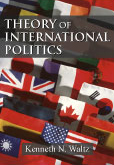“Ken Waltz’s Theory of International Politics is a bedrock text for upper-level undergraduate and grad-level seminars in international relations. Waveland’s edition makes it a welcome addition to syllabi and its price a welcome relief for students’ pockets.” — Steven Jackson, Indiana University of Pennsylvania
"Waltz's Theory of International Politics is a classic and has great value today as power relations shift among major states in the system." — James Rae, California State University, Sacramento
"This is one of the seminal texts in international relations. I'm thrilled to see it in print again. Thank you so much for committing to it!" — Christopher Moore, Bethel University

251 pages, $41.95 list
1-57766-670-4
978-1-57766-670-7
© 1979
paperback
eBook availability
Theory of International Politics
The late Kenneth Waltz was a towering figure in the study of international relations. His theoretical insights and his seminal contribution to neorealism will remain an enduring part of understanding how the world works. Waltz's theoretical insights into international relations do not attempt to predict specific state actions. Rather, they explain general principles of behavior that govern relations between states. He presents the merits of an anarchic international system.
From Theory of International Politics . . . "National politics is the realm of authority, of administration, and of law. International politics is the realm of power, of struggle, and of accommodation. . . . States, like people, are insecure in proportion to the extent of their freedom. If freedom is wanted, insecurity must be accepted. Organizations that establish relations of authority and control may increase security as they decrease freedom. If might does not make right, whether among people or states, then some institution or agency has intervened to lift them out of nature's realm. The more influential the agency, the stronger the desire to control it becomes. In contrast, units in an anarchic order act for their own sakes and not for the sake of preserving an organization and furthering their fortunes within it. Force is used for one's own interest. In the absence of organization, people or states are free to leave one another alone. Even when they do not do so, they are better able, in the absence of the politics of the organization, to concentrate on the politics of the problem and to aim for a minimum agreement that will permit their separate existence rather than a maximum agreement for the sake of maintaining unity. If might decides, then bloody struggles over right can more easily be avoided."
From Theory of International Politics . . . "National politics is the realm of authority, of administration, and of law. International politics is the realm of power, of struggle, and of accommodation. . . . States, like people, are insecure in proportion to the extent of their freedom. If freedom is wanted, insecurity must be accepted. Organizations that establish relations of authority and control may increase security as they decrease freedom. If might does not make right, whether among people or states, then some institution or agency has intervened to lift them out of nature's realm. The more influential the agency, the stronger the desire to control it becomes. In contrast, units in an anarchic order act for their own sakes and not for the sake of preserving an organization and furthering their fortunes within it. Force is used for one's own interest. In the absence of organization, people or states are free to leave one another alone. Even when they do not do so, they are better able, in the absence of the politics of the organization, to concentrate on the politics of the problem and to aim for a minimum agreement that will permit their separate existence rather than a maximum agreement for the sake of maintaining unity. If might decides, then bloody struggles over right can more easily be avoided."
Reactions
1. Laws and Theories
2. Reductionist Theories
3. Systemic Approaches and Theories
4. Reductionist and Systemic Theories
5. Political Structures
6. Anarchic Orders and Balances of Power
7. Structural Causes and Economic Effects
8. Structural Causes and Military Effects
9. The Management of International Affairs
2. Reductionist Theories
3. Systemic Approaches and Theories
4. Reductionist and Systemic Theories
5. Political Structures
6. Anarchic Orders and Balances of Power
7. Structural Causes and Economic Effects
8. Structural Causes and Military Effects
9. The Management of International Affairs